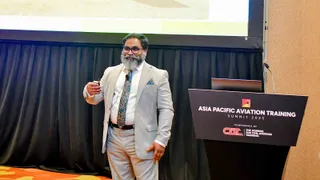Emerging Tech, Pilot Shortage, 1500-Hour Rule Dominate Discussion
Contact Our Team
For more information about how Halldale can add value to your marketing and promotional campaigns or to discuss event exhibitor and sponsorship opportunities, contact our team to find out more
The Americas -
holly.foster@halldale.com
Rest of World -
jeremy@halldale.com

WATS Pilot Conference Session 1: Airline Training Leader Roundtable - “What’s Next for the Pilot Training Industry”
At the opening WATS 2022 conference session, four diverse training community leaders opened the spigot on relevant topics that will have major implications for the pilot training enterprise well beyond this decade.
Emerging learning technologies were evident on the expanses of the WATS exposition floor and a common, topical thread throughout the roundtable. The panel members said these enablers will populate future pilot learning programs – yet noted these products’ baseline technologies will need to mature for wider implementation, and wise acquisition decisions will be also required by instructional design teams.
Jeff Winter, Vice President at JetBlue University, revealed his organization continues to run proof of concepts with VR and other technologies. The executive conveyed his team’s early lessons learned, first offering a limiting use factor is whether the application solves an existing requirement or training gap, or is addressing a problem that doesn’t exist. “And then there is the broader ROI (return on investment) issue.”
"Once you figure out what you’re going to put in VR, there is a future for these devices"
Bryan Quigley, Chairman of the Board of the United Aviate Academy and Senior Vice President for Flight Operations at United Airlines, pointed out that recent learning technologies allow the pilot to focus on certain areas that do not, and should not, require an actual aircraft or flight training device. “You also need to look at the 19th Air Force’s [AETC] expanding use of VR; there are lots of great uses.” On cue, Chris Broom, Vice President for Commercial Training Solutions at Boeing Global Sources, noted that from his industry position, “Once you figure out what you’re going to put in VR, there is a future for these devices. Look at military training and maintenance training, too.”
The issue of a pilot supply shortage emerged. Again. The panel members addressed several issues they observed are contributing to the supply-demand mismatch in the US. Brad Lambert, Vice President for Flight Operations at Frontier Airlines, called for a democratization, or knocking down the financial barriers to entering the airline profession. JetBlue’s Winter noted JetBlue’s Gateways programs continue to open the door for both crew members and external applicants to pursue a path to a pilot or maintenance technician position at JetBlue. He then echoed Lambert by adding, “Financing remains a huge issue – and the day is coming – when we need to better address this issue.”
"There will be major changes in the next five years"
Noting some cadets in accession programs are receiving compensation, he asserted more help is needed. “While banks at first resisted our outreach to them, banks are now approaching JetBlue [to help provide financial tools]. There will be major changes in the next five years.”
An adjacent, contentious topic in the US commercial airline industry remains the FAA 1500-hour rule. CAT Editor Rick Adams asked the panelists if the rule is “set in stone”? With this regulation, the US appears to be “going it alone,” with air carriers in other nations moving toward competency-based learning and other strategies to certify and qualify air crew members. The panel’s consensus was that the US commercial aviation industry and its many stakeholders need to collectively take action to modify this rule.
JetBlue’s Winter initially pointed to European and Japanese carriers as examples of airlines being able to safely operate using competency-based and alternate strategies when compared to the US model. Yet, as the 1500-hour rule was advanced through US Congressional mandate, Winter offered that it will require “bold people, taking bold steps” to change the rule and mandating fewer hours to enter the flight deck – with a required alignment and consensus of the industry, academia and other stakeholders.
United’s Quigley placed the issue in a whole-of-nation, economic context, noting it will require a national political consensus for change. “This will take a political will with economic input, for example, how many more small US communities can lose air service because of a pilot shortage.” Quigley noted that while United’s Aviate program is providing another accession source for the air carrier’s pilots, it is also extending its recruiting outreach to universities.
Capt. Paul Preidecker, Flight Deck Insights, was the session moderator.


